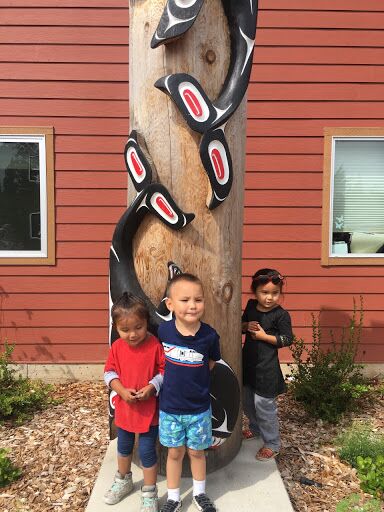By Alex Elizabeth Stribling, Lead Toddler Teacher
Children touch the plants in the garden as a sensory experience.
Northwest Indian College’s Early Learning Center innovated an Interactive Sensory Garden helping preschool children to engage in experiential STEM education. The lush and lively garden is the very first thing children see when they come to school, making it even more engaging when their teachers guide a walk through it. Whether students are experiencing rain or sunshine, children engaged in the garden and witnessed the plants growing over the last few months. As teachers, we can only do so much by showing children how plants grow through pictures and arts/crafts. To have a live sensory garden greet them every day is something only mother nature can teach.
What piques the children’s interest most are the different plant textures. Stachys byzantina (lamb’s ear) has been an instant favorite, which the children refer to as “bunny ears.” It is one of the larger plants toward which the children gravitate and is too intriguing not to touch. We also have several tiny succulents that grow all over sensory garden. With a little guidance from teachers – since some of them are so tiny to see – the children gather and express awe at the plants’ waxy coats.
Children play in Northwest Indian College’s garden while learning.
To maintain the garden, the children and teachers go out with scissors and water pails to give the sensory garden a “haircut” and a “drink.” After trimming weeds and flowers, we bring the plants back into the classroom to examine them (through sight, touch, and smell). Children also paint with the leaves and make stamps with them. The garden is definitely well used!
The impact of the sensory garden has been helpful and useful to children and teachers, showing the children that education is not bound within the four walls of a classroom. We are reinforcing Native family values and practices by demonstrating to children that learning is a constant exploration in our everyday lives – inside and outside. The garden has been a great teaching tool when the teachers explain the process of the plant’s life cycle. We also have the opportunity to discover new bugs and insects as we sift through the garden. The bees were out this past summer, which resulted in excellent conversations about their purpose as pollinators!
The sensory garden prompts children and adults alike to engage outside of the box. It is space to discover what our natural elements can teach us, reminding people of all ages that it is a good thing to take the time to wander, engage, learn, and grow.

